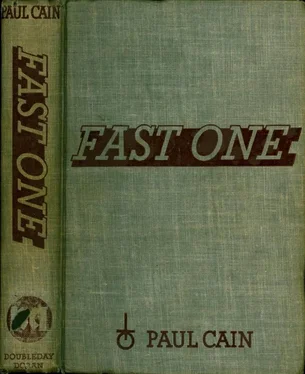“Don’t call me girlie, you son of a bitch!”
Kells looked at Granquist, shook his head sadly. “That’s something you forgot to tell me about,” he said.
“I want all the pictures,” the fat man repeated, “an’ I want two letters — quick.”
Granquist was staring at the fat man. She turned slowly to Kells. “That’s a lie, Gerry. I didn’t crack to Bellmann.”
Fenner stood up. “I won’t stand for this,” he said. He thrust his hands in his pockets and took a step forward.
“Sit down.” The fat man moved the revolver slightly until it focused on Fenner’s stomach.
Fenner stood still.
Kells said: “Does the fella who sent you know that if anything happens Jo me the whole inside gets a swell spread in the morning papers?”
The fat man smiled.
“The inside on Haardt and the barge and Perry, and the Sunday-school picnic at Big Bear?” Kells went on.
Granquist was watching him intently.
“I made that arrangement this afternoon.” Kells leaned side-wise slowly and put his empty glass on an end table.
The fat man looked at Fenner and Kells, and then he looked at Granquist, and at the bag tucked into the chair beside her. He said: “That’s a dandy. Let’s have a look at it, girlie.”
Granquist stood up in one swift and precise movement. She moved to the window so swiftly that the fat man had only time to stand up and take one step toward her before she had moved the drape aside with her shoulder, crashed the bag through the window.
Glass tinkled on the sill.
Kells stood up in the same instant and brought his right fist up from the divan in a long arc to the side of the gray-faced young man’s jaw. The young man spun half around and Kells swung his right fist again to the same place. The young man fell half on the divan, half on the floor.
The fat man moved toward Kells, stopped in the center of the floor.
Granquist yelled: “Smack him, Gerry...”
Kells stood with his feet wide apart. He grinned at the fat man.
Fenner was standing near Granquist at the window. His eyes were wide and he tried to say something but the words stuck in his throat.
The fat man backed toward the door. “I ain’t got orders to shoot,” he said, “but I sure will if you press me.” He backed out into the semidarkness of the hallway and then the outer door slammed.
Granquist ran across the room, stopped a moment in the doorway, turned her head toward Kells. She said, “I’ll get the bag,” and she spoke so rapidly, so breathlessly, that the words were all run together into one word. She went into the darkness.
Kells turned to Fenner. “Give her a hand.”
He bent over the young man, took a small automatic out of his raincoat pocket and handed it to Fenner. “Hurry up — I’ve got to telephone — I’ll be right down.”
Fenner took the automatic dazedly. He looked at the man on the floor and at Kells, and then he came suddenly to life. “It’s in the court,” he said excitedly. “I can get out there from the third floor.”
“Maybe the bag was a stall. Don’t let her get out of your sight.” Kells sat down at the telephone.
Fenner hurried out of the room.
Kells waited until he heard the outer door slam, then got up and went to Dillon. He knelt and drew a long yellow envelope from Dillon’s inside breast pocket. It was heavily sealed. He tore off the end and looked inside. Then, smiling blankly, he tucked it into his pocket.
He went to the broken window, raised it carefully and leaned out over the wet darkness of the court for a moment. He went into the kitchen and stood on the stove, looked through the high ventilating window across the narrow air-shaft to the window of an adjoining apartment. Then he went into the bedroom and got his hat and Granquist’s coat and went out of the apartment, across the corridor to the elevator.
On the way down, he spoke to the elevator boy: “It is still raining?”
“Yes, sir. It looks like it was going to rain all night.”
Kells said: “I wouldn’t be surprised.”
The night clerk came out of the telephone operator’s compartment.
Kells leaned on the desk. “Your Mister Dillon is in ten-six-teen. He had an accident. There’s another man in there whom Fenner will file charges against. Have the house dick hold him till Fenner gets back.”
He started to go, paused, said over his shoulder: “Maybe you’ll find another one trying to get in or out of the court. Probably not.”
He went out and walked up Ivar to Yucca, west on Yucca the short block to Cahuenga. The rain had become a gentle mist for the moment; it was warm, and occasional thunder drummed over the hills to the north. He went into an apartment house on the corner and asked the night man if Mister Beery was in.
“He went out about ten minutes ago.” The night man thought he might be in the drugstore across the street.
Beery was crouched over a cup of coffee at the soda fountain. Kells sat down beside him and ordered a glass of water, washed down two aspirin tablets. He said: “If you want to come along with me, you might get some more material for your memoirs.”
Beery put a dime on the counter and they went out, over to Wilcox. They went into the Wilcox entrance of the Lido, upstairs to the fourth floor and around through a long corridor to number four thirty-two.
Granquist opened the door. Her face was so drained of color that her mouth looked dark and bloody in contrast to her skin. Her mouth was slightly open and her eyes were wide, burning. She held her arms stiffly at her sides.
There was a man lying on his face, half in, half out of the bathroom. His arms were doubled up under his body.
Beery walked past Granquist, slowly across the room to a table. He turned his head slowly as he walked, kept his eyes on the man on the floor. He took off his hat and put it on the table.
Kells closed the door quietly and stood with his back against it.
Granquist stared at him without change of expression.
Beery glanced at them.
Kells smiled a little. He said: “This isn’t what I meant, Shep — maybe it’s better.”
Beery went to the man on the floor, squatted and turned the head sidewise.
Granquist swallowed. She said: “Gerry, I didn’t do it. I didn’t do it.”
Beery spoke softly, without looking up: “Bellmann.”
Kells locked the door. He looked at the floor, then he went to the table and reached under it with his foot, kicked an automatic out into the light.
Granquist walked unsteadily to a chair, sat down and stared vacantly at Beery bending over the body. She said in a hollow, monotonous voice: “He was like that when I came in. I stopped downstairs and then I came up in the elevator and he was like that when I came in — just a minute ago.”
Kells didn’t look at her. He took out a handkerchief and picked up the automatic and held it to his nose. He held it carefully by the handkerchief and snapped the magazine out of the grip, said: “Two.”
Beery stood up.
Kells laughed suddenly. He threw back his head and roared with laughter. He sat down and put the automatic on the table, wiped his eyes with the handkerchief.
“It’s beautiful!” he said brokenly.
Granquist stared at Kells and then she leaned back in the chair and her eyes were very frightened. She said: “I didn’t do it,” over and over again.
Kells’ laughter finally wore itself out. He wiped his eyes with the handkerchief and then he looked up at Beery. “Well,” he said, “why the hell don’t you get on the phone? You’ve got the scoop of the season.”
He leaned back and smiled at the ceiling, improvised headlines: “Boss Bellmann Bumped Off By Beauty. Pillar of Church Meets Maker. Politician — let’s see — Politician Plugged as Prowler by Light Lady.” He stood up and crossed quickly to Beery, emphasized his words with a long white finger against Beery’s chest. “Here’s a pip! Reformer Foiled in Rape. Killer says: ‘I shot to save my honor, the priceless inheritance of American womanhood.’”
Читать дальше












